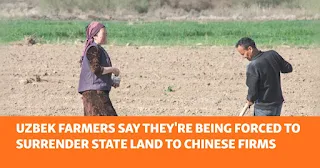Farmers in Uzbekistan report that the government is compelling them to hand over their land to Chinese companies under the pretext of state-supported development, resulting in the loss of thousands of hectares of fertile cotton and wheat fields to local residents.
Worried about the future of the lush lands in the Ferghana Valley, they shared their concerns with Radio Free Europe/Radio Liberty, stating that significant areas of land have been designated as state reserves and transferred to Chinese investors.
While official documents claim that these land transfers are voluntary, numerous testimonies provided to RFE/RL by those who relinquished their land suggest a different story: they describe experiences of coercion, threats, and intimidation from Uzbek law enforcement officials acting on the directives of local authorities.
"The governor warned me, 'This is a presidential order. You either relinquish the land or face imprisonment,'" recounted a farmer who requested anonymity due to concerns about potential repercussions for speaking out.
Rising Tensions?
Land transfers in the Ferghana Valley, which spans Uzbekistan, Kyrgyzstan, and Tajikistan, have emerged as a significant point of contention in Central Asia. This situation reflects a growing and volatile wave of anti-Chinese sentiment fueled by land disputes, reliance on debt, labor market issues, and apprehensions about increasing foreign influence.
Under Uzbekistan's Law on Farming, farmers can lease state land for a period of 49 years, and neither local authorities nor prosecutors have the power to revoke these leases. The law stipulates that land can only be confiscated by the state through a court ruling. However, farmers report that land seizures are occurring based on verbal orders from Shuhrat Abdurahmonov, the regional head.
"I didn't want to give up my land and tried to resist, but in response, the district governor summoned over 20 police officers and members of the National Guard to the district administration building and instructed them to arrest me and my wife," a farmer from the Qurgonteppa district told RFE/RL.
This is why the farmers do not resist now; they risk imprisonment if they do. The chances of any of us leaving that situation alive and unharmed are slim.
When RFE/RL reached out, regional administrations did not respond to the farmers' claims.
Concerns about China's increasing control over vast areas of land extend beyond just the farming community. In recent years, Beijing's economic influence in Central Asia has surged, driven by its ambitious Belt and Road Initiative.
As of early 2025, China has become Uzbekistan's largest trading partner, with bilateral trade amounting to $12.5 billion. There are over 3,400 Chinese companies operating in the country, outnumbering Russian firms.
Similar trends are also evident in other Central Asian nations, including Kazakhstan.
'Economic Trap'
Chinese investments offer promises of infrastructure, job creation, and advanced technology. However, experts caution about a more troubling aspect. Kyrgyz political analyst Nargiza Muratalieva highlights that Central Asian nations are increasingly ensnared in what she terms China's "economic trap." This involves easy access to credit—often with unclear terms—that can ultimately render weaker states susceptible to political influence or loss of assets.
Muratalieva cites a notable instance from 2011, when Beijing acquired over 1,100 square kilometers of land in Tajikistan in exchange for debt relief, illustrating the potential risks of falling into this "trap." Currently, China stands as the largest lender to Uzbekistan, with outstanding loans amounting to $3.8 billion.
According to Muratalieva, "The common traits of Chinese lending across the region include the ease of securing loans, the challenges of repayment, and a lack of transparency regarding procedures and specific conditions."
Debt repayments, land transfers, and increasing Chinese economic influence contribute to local sentiments of "neocolonialism," particularly when communities are left out of decision-making processes. The severe treatment of Uyghurs and other non-Han indigenous groups in Xinjiang resonates strongly with Central Asians, who have linguistic, cultural, and religious connections to them. Regardless of whether it is propaganda, the fear that China might eventually treat Kazakhs or Uzbeks similarly has intensified resistance to Beijing's growing presence in the region.
A farmer from Uzbekistan's western Andijon region shared with RFE/RL, "It appears that the Chinese have a strong interest in our land; they also aim to acquire land from other farmers. We are firmly opposed to this, but the district governor, the prosecutor, and the police chief are persistently pressuring us. Our greatest concern is that they could eventually take over our country and treat us in the same manner as they did the Uyghurs in Xinjiang."



